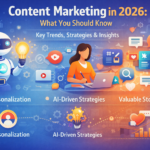
The Real Power of Content Marketing: Definition & Purpose
Introduction to Content Marketing
In recent years, content marketing has emerged as a pivotal strategy within the realm of digital marketing, reflecting a significant shift from traditional advertising methods. Businesses are increasingly recognizing the importance of delivering valuable and relevant content to attract and engage their target audiences. This transition is a response to changing consumer behaviors and preferences, where audiences are more inclined to seek information and insights before making purchasing decisions, rather than relying solely on promotional messaging.
Table Of Content
The essence of marketing lies in creating and disseminating high-quality content that resonates with consumers’ interests and needs. Unlike conventional methods that focus primarily on sales pitches, content marketing emphasizes informative, educational, or entertaining content that builds trust and fosters a long-lasting relationship with the audience. By providing value through blog posts, videos, infographics, and other formats, businesses not only enhance customer engagement but also position themselves as industry thought leaders.
This approach to marketing serves dual purposes: driving traffic to websites and nurturing leads through the buyer’s journey. As potential customers interact with compelling content, they become more familiar with the brand, often leading to higher conversion rates. This is particularly important in an era where consumers are inundated with advertisements from various channels and are becoming increasingly adept at tuning them out. Content marketing differentiates a brand by focusing on storytelling and relevance, thus ensuring that the content reaches the intended audience effectively.
As we delve deeper into the definition and purposes of content marketing, it is essential to acknowledge its role in fostering customer loyalty and engagement in today’s competitive marketplace. By prioritizing quality content, businesses can adhere to the evolving demands of consumers, ultimately leading to sustained growth and success.
What is Content Marketing?
Content marketing is a strategic approach aimed at creating and distributing valuable, relevant, and consistent content to attract and engage a clearly defined audience. The primary goal is to drive profitable customer action, establishing a connection that transcends the conventional sales pitch found in traditional marketing methods. Unlike traditional marketing, which primarily focuses on direct sales and product promotion, content marketing revolves around providing information that educates and informs potential customers, fostering a deeper relationship over time.
At its core, content marketing encompasses various forms of content, including blog posts, videos, podcasts, infographics, and social media updates. Each piece of content is designed with the intent of solving a particular problem or meeting a specific need of the target audience. This positions the brand as a reliable source of information, creating trust that can lead to increased loyalty and sustained customer relationships. Consequently, successful content marketing not only aims to inform the audience but also to engage them in a meaningful dialogue.
Moreover, the distribution strategy plays a critical role in content marketing. It involves sharing the crafted content across multiple platforms and channels to maximize reach and engagement. Utilizing social media, email newsletters, and SEO tactics enhances visibility, allowing brands to position their content in front of a wider audience. This unique approach helps cultivate an interactive environment where customer feedback and insights can influence future content strategies.
In contrast to the often one-way communication of traditional marketing, content marketing emphasizes an ongoing conversation with the audience. By prioritizing education and engagement, brands can create a loyal following, ultimately leading to enhanced customer retention and long-term success. This modern marketing paradigm underscores the significance of understanding customer needs and preferences, distinguishing itself in today’s competitive landscape.
The Key Components of Content Marketing
Content marketing is a strategic approach focusing on creating, distributing, and analyzing valuable content to attract and engage a clearly defined audience. The essential components of content marketing can be categorized into four main areas: content creation, strategy, distribution, and analysis. Each of these elements plays a vital role in ensuring that content marketing efforts are effective and aligned with overall business goals.
Firstly, content creation is the foundation of any content marketing initiative. It encompasses the generation of various types of content, including blogs, videos, podcasts, and infographics. Each format serves distinct purposes and targets different stages of the customer journey. For example, blog posts can provide in-depth information, while videos might engage the audience on an emotional level. Infographics, on the other hand, can simplify complex data, making it more digestible for viewers. By diversifying content types, brands can address the varied preferences of their target audience.
Secondly, the strategy is integral to content marketing. This involves defining the goals, understanding the target audience, and establishing the brand’s voice. A well-defined strategy ensures that the content is relevant and resonates with the intended audience. Furthermore, it helps in aligning the created content with the overarching marketing objectives, enabling brands to effectively nurture leads through the buyer’s journey.
Distribution is the next critical component, as it determines how content reaches the audience. This can include sharing content across social media platforms, email newsletters, or through collaborations with influencers and industry partners. Effective distribution maximizes content visibility and encourages engagement, driving the necessary traffic towards the brand’s website or channels.
Finally, analyzing the performance of content is essential for understanding its impact. Measurement tools enable marketers to track metrics such as engagement rates, conversion rates, and overall traffic.
The Purpose of Content Marketing
Content marketing serves several essential purposes that are integral to the overall success of a business. Primarily, it is a powerful tool for increasing brand awareness. By producing relevant and valuable content, businesses can capture the attention of potential customers and establish themselves as thought leaders in their industry. This initial engagement is crucial for attracting new audiences, improving visibility, and fostering a recognizable brand identity.
Another critical objective of content marketing is lead generation. High-quality content creates touchpoints where potential customers can engage with a brand, nurturing interest and guiding them along the buyer’s journey. Effective strategies include creating informative articles, engaging videos, and compelling infographics that resonate with the target audience and encourage them to seek more information about the products or services offered. By incorporating strategic calls-to-action within this content, businesses can funnel leads into their sales systems and ultimately enhance their conversion rates.
Moreover, content marketing plays a vital role in building customer loyalty. Once a business has attracted customers, maintaining their attention is essential. Regularly updated content that is valuable and relevant helps establish trust and an ongoing relationship with the audience. This trust can lead to repeat business and word-of-mouth referrals, as satisfied customers share their experiences and insights with others.
Lastly, boosting conversion rates is a significant goal of effective content marketing. By creating content that addresses user pain points and provides solutions, companies can persuade potential customers to take action, whether making a purchase, signing up for a newsletter, or engaging on social media. Overall, strategic content marketing aligns with business goals, amplifying brand presence, generating leads, nurturing customer relationships, and ultimately driving sales.
How Content Marketing Fits into the Marketing Strategy
Content marketing serves as a pivotal component within the broader marketing strategy of any organization. It not only fosters brand loyalty but also enhances customer engagement by delivering valuable, relevant, and consistent content. This strategic approach complements other marketing techniques, such as search engine optimization (SEO) and social media marketing, creating a cohesive framework that amplifies overall effectiveness.
At its core, content marketing emphasizes the importance of creating high-quality materials that resonate with the target audience. When executed properly, it aligns seamlessly with SEO efforts. High-quality content optimized for search engines increases visibility, thereby attracting more organic traffic. By weaving in relevant keywords and maintaining a user-centric focus, businesses can boost their rankings on search engine results pages (SERPs), making their content more accessible to potential customers.
Furthermore, integrating content marketing with social media strategies enables brands to maximize their reach. Social media platforms serve as excellent channels for amplifying content, fostering discussions, and encouraging sharing. Informative blog posts, engaging videos, or infographics can be strategically disseminated across these platforms, encouraging dialogue and interaction. This symbiotic relationship ensures that content reaches the intended audience while fostering community engagement and interaction with the brand.
Additionally, a well-rounded content marketing strategy can facilitate insights into customer preferences and behaviors. By analyzing engagement metrics and feedback, businesses can adapt their content to better serve their audience’s evolving needs. This data-driven approach not only enhances relationships with consumers but also allows businesses to fine-tune their marketing strategies effectively.
Ultimately, when organizations harmonize content marketing with other strategic frameworks, they position themselves for long-term success. By realizing the interconnectedness of these methods, companies can create more effective campaigns that resonate deeply with their audience and reinforce their brand identity.
The Benefits of Content Marketing
Content marketing is a strategic approach focused on creating and distributing valuable, relevant content aimed at attracting and retaining a clearly defined audience. This form of marketing offers a myriad of benefits for businesses, making it a vital component of a comprehensive marketing strategy.
One significant advantage of content marketing is its cost-effectiveness. Compared to traditional marketing methods, such as print advertising or television commercials, content marketing often requires a lower initial investment. Additionally, it generates three times more leads per dollar spent, making it an ideal choice for businesses with budget constraints. This economic efficiency allows even startups and small enterprises to compete more effectively in their respective markets.
Moreover, content marketing serves as a foundation for long-term return on investment (ROI). Unlike fleeting advertisements that may only capture attention momentarily, quality content lives on the web, enabling continued traffic and engagement over time. For example, informative blog posts or instructional videos can educate customers, positioning businesses as trusted sources of information. This enduring presence fosters brand loyalty, ultimately transforming initial interest into sustained customer relationships.
Building authority within a niche is another crucial benefit of content marketing. By consistently delivering insightful content, businesses establish themselves as thought leaders in their industry. This not only enhances credibility but also cultivates trust among the audience. Customers are more likely to engage with and purchase from brands they perceive as knowledgeable and reliable.
Improved customer engagement is perhaps the most noticeable advantage of a well-executed content marketing strategy. Quality content encourages conversations, invites feedback, and fosters a community around a brand. Through this interactive dynamic, businesses can gather valuable insights into their customers’ preferences and needs, allowing for better-tailored offerings in the future.
Common Content Marketing Challenges
Content marketing has emerged as a crucial strategy for businesses seeking to engage their audience, build brand loyalty, and drive conversions. However, organizations often encounter various challenges in their content marketing efforts that can hinder their success. One common challenge is inconsistency in content creation and distribution. Businesses may struggle to maintain a regular publishing schedule, which may lead to decreased audience engagement and diminished brand authority. It is essential to establish a well-defined content calendar that outlines topics, publication dates, and responsible team members to avoid such inconsistency.
Measuring success also poses a significant obstacle in content marketing. Many organizations find it difficult to quantify the effectiveness of their content efforts. Without clear metrics and key performance indicators (KPIs), it becomes challenging to determine return on investment (ROI) and make informed decisions about future strategies. To address this issue, businesses should leverage analytics tools to track essential data points such as website traffic, engagement rates, and conversion rates. Setting specific, measurable goals related to each content piece can provide valuable insights into what resonates with the audience.
Staying relevant is another critical challenge in the fast-paced world of content marketing. Trends and consumer preferences evolve rapidly, and businesses must stay updated to avoid creating outdated content that fails to engage the target audience. Conducting regular market research and audience analysis can help businesses identify emerging trends and adapt their content strategies accordingly.
Overcoming these challenges is vital for effective content marketing. Companies that successfully address inconsistencies, measure their efforts, and remain current with industry trends are better positioned to engage customers and achieve their marketing objectives. By implementing structured planning and utilizing appropriate analytical tools, organizations can enhance their content marketing strategy and maximize its impact.
Case Studies of Brands Using Valuable Content to Grow
Content marketing has yielded impressive results for numerous brands across diverse industries, demonstrating its potential to engage audiences and drive business growth. One notable example is Red Bull, the energy drink company that extended its brand beyond traditional advertising. By creating captivating content, including adrenaline-pumping videos and sponsoring extreme sports events, Red Bull has established itself as a premier lifestyle brand. This content-driven approach has not only attracted a dedicated fanbase but also enhanced brand loyalty, resulting in increased sales and market share.
Another standout case is HubSpot, a company specializing in inbound marketing software. HubSpot’s content marketing strategy revolves around providing valuable educational resources, such as blogs, eBooks, and webinars. By positioning itself as a thought leader in the marketing domain, HubSpot effectively attracts potential customers by offering solutions to their problems. The result is a significant increase in leads and conversions, demonstrating the effectiveness of well-structured content that addresses audience queries and needs.
Coca-Cola’s “Share a Coke” campaign further exemplifies successful content marketing. The brand transformed its packaging by replacing its iconic logo with popular names and phrases, encouraging social sharing among customers. Paired with an active social media strategy that invited users to share their personalized Coca-Cola experiences, the campaign resonated with consumers on a personal level. This initiative not only spurred engagement but also rejuvenated the brand’s image, leading to noteworthy sales growth.
In the realm of B2B, Adobe’s content marketing efforts have been exemplary. By developing informative resources, such as case studies, white papers, and creative webinars, Adobe has cultivated a community of designers and marketing professionals eager to learn and share knowledge. This strategic content engagement positions Adobe as a valuable partner in professional growth, subsequently driving product usage and customer retention.
Conclusion:
As we navigate through an increasingly digital landscape, the significance of content marketing continues to evolve. The past decade has witnessed sweeping changes in consumer behavior, media consumption, and the tools available for content dissemination. With the advent of artificial intelligence, data analytics, and organic social media reach, the way businesses interact with audiences has transformed remarkably. Companies that prioritize content marketing as part of their broader strategy stand to benefit enormously from this transition.
The core objective of content marketing remains unchanged: to create and distribute valuable, relevant content that attracts and engages a specific audience. However, the methods by which this is achieved are developing. Increasingly, organizations are turning to interactive content, videos, podcasts, and personalized emails to deliver messages that resonate with their target audience. This dynamic approach not only enhances user experiences but also drives conversions in ways static content cannot.
Moreover, as consumers demand authenticity and transparency, content marketing must adapt accordingly. Today’s audiences prefer brands that share a relatable narrative or demonstrate social responsibility. As such, companies that can effectively convey their values through compelling content will likely forge stronger connections with their consumers. The necessity for empathy in storytelling is paramount; businesses that fail to align their messages with consumer values risk falling behind.
In light of these trends, it is essential for organizations to adopt a proactive stance regarding content marketing. Embracing innovative tactics while remaining true to the core principles of value-driven content creation will be crucial in ensuring long-term success. By continuously refining their strategies and staying attuned to evolving market demands, businesses can harness the power of content marketing to enhance their brand presence and achieve their goals.





I love the way you explain SEO without all the fluff
Your tip about keyword clusters was a game-changer